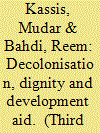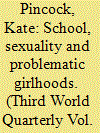| Srl | Item |
| 1 |
ID:
148281


|
|
|
|
|
| Summary/Abstract |
Taking Palestine as the focus of inquiry, and drawing on our experiences as co-directors of Karamah, a judicial education initiative focused on dignity, we reflect on the attributes of colonisation and the possibilities of decolonisation in Palestine through development aid. We conclude that decolonisation is possible even within development aid frameworks. We envision the current colonial condition in Palestine as a multi-faceted, complex and dynamic mesh that tightens and expands its control over the coveted colonial subject but that also contains holes that offer opportunities for resistance or refusal. We turn to Karamah to illustrate how some judges have insisted on a professional identity that merges the concepts of human dignity and self-determination and ultimately rejects the colonial condition inherent in both occupation and development aid. We conclude that in this process of professional identity (re)formation, members of the Palestinian judiciary have helped reveal the demands of decolonisation by demonstrating their commitment to realising human dignity through institutional power, and bringing occupation back into international development discourse.
|
|
|
|
|
|
|
|
|
|
|
|
|
|
|
|
| 2 |
ID:
163050


|
|
|
|
|
| Summary/Abstract |
This article provides a critical examination of the current extensive promotion of ‘self-reliance’ for refugees. The existing scholarship largely ignores the unsuccessful historical record of international assistance to foster refugees’ self-reliance and fails to discuss its problematic linkages to neoliberalism and the notion of ‘dependency’. The article reveals that the current conceptualisation and practice of self-reliance are largely shaped by the priorities of international donors that aim to create cost-effective exit strategies from long-term refugee populations. The authors argue that where uncritically interpreted and applied, the promotion of self-reliance can result in unintended and undesirable consequences for refugees’ well-being and protection.
|
|
|
|
|
|
|
|
|
|
|
|
|
|
|
|
| 3 |
ID:
158646


|
|
|
|
|
| Summary/Abstract |
This paper draws on ethnographic research with teenage schoolgirls in Tanzania to explore the impact of education on their experiences of sexual agency and empowerment. School-based education is frequently presented within international development as a route for empowering girls to exercise agency over their sexuality; yet school itself often constitutes a space in which the same restrictive gendered and sexual norms that exist outside the classroom are reproduced or go unchallenged by those working with girls. Despite the constraints to their agency from both outside and within school, girls themselves do resist the narratives of girlhood and sexuality imposed upon them. Recognising how these dynamics challenge our understanding of sexual empowerment is key to finding ways to support girls in navigating repressive norms beyond the classroom.
|
|
|
|
|
|
|
|
|
|
|
|
|
|
|
|
| 4 |
ID:
164830


|
|
|
|
|
| Summary/Abstract |
Despite global pressure and national security concerns, the efforts of the Government of Pakistan to reform the madrassah system have proven to be futile. Extant literature on madrassah reform challenges relies overwhelmingly on information provided by governments and experts situated outside of these institutions. While these studies and reports present important findings and viable analysis on madrassah systems; most of the research fails to give voice to the major stakeholders of this system itself, such as the administration staff, teachers, students and parents. Our study fills this crucial gap by conducting semi-structured interviews and field observations inside Pakistani madaris (plural for madrassah) and their professional associations. We find that these madaris have been reluctant to participate in policy interventions offered by the government due to a major trust deficit brought on by differences over financial and curriculum regulation, degree recognition and the government’s role in shaping popular perceptions about madaris. This reluctance has turned down attempts for madrassah reformation and has in turn made them vulnerable to radicalisation. We conclude with policy recommendations for more effective government reforms and a stronger relationship between madrassah representatives and the Government of Pakistan.
|
|
|
|
|
|
|
|
|
|
|
|
|
|
|
|